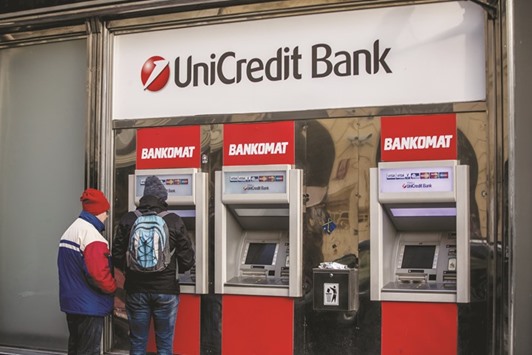UniCredit began Italy’s biggest corporate share sale yesterday in an attempt to raise €13bn ($14bn) to rebuild the bank’s capital after a balance sheet clean up.
Banks in Italy have been struggling to deal with bad loans left behind by a deep recession, leading to a series of capital raisings and consolidation in the sector as Rome tries to steady confidence in the sector.
UniCredit said last week it will post an €11.8bn loss for 2016 due to one-off hits stemming mainly from loan writedowns, as it prepares to offload €17.7bn in bad debts under a restructuring plan outlined in December.
This follows the hiring by Italy’s biggest bank by assets of French investment banker Jean Pierre Mustier as its new chief executive in July, with a brief to address long-standing concerns about UniCredit’s weak capital base.
As part of the wider restructuring, UniCredit said on Saturday it had agreed with unions 3,900 lay-offs in Italy as part of its plan to cut 14,000 staff by 2019. By 1053 GMT shares in UniCredit had fallen 2.4% to €12.78, against a 1% drop in Italy’s banking sector.
Rights to buy into the cash call, Europe’s largest since 2010, fell 7.5%, which a Milan-based trader said was a smaller-than-expected drop.
A second trader confirmed both the stock and the rights were holding up well.
Shareholders who do not exercise their rights face a dilution of their stake of more than 70%.
UniCredit said on Friday that none of its shareholders with a stake of at least 3% had yet committed to buy into the share sale.
Its top shareholder is US
investment firm Capital Research and Management Company with 6.7%, followed by Abu Dhabi’s sovereign wealth fund Aabar and asset manager BlackRock with a stake of about 5% each.
Sources told Reuters last month Aabar was set to buy into the share issue.
UniCredit is offering 13 new shares — at a price of €8.09 each — every five ordinary or savings shares already owned.
The price entails a 38% discount to the value of the stock, excluding subscription rights.
The share offer is due to end by March 10, when a coupon payment is due on some high-risk bonds that the bank would not be able to honour without lifting its capital back above regulatory thresholds.

Customers use a UniCredit ATM in central Prague, Czech Republic. UniCredit is offering 13 new shares u2014 at a price of u20ac8.09 each u2014 every five ordinary or savings shares already owned.
